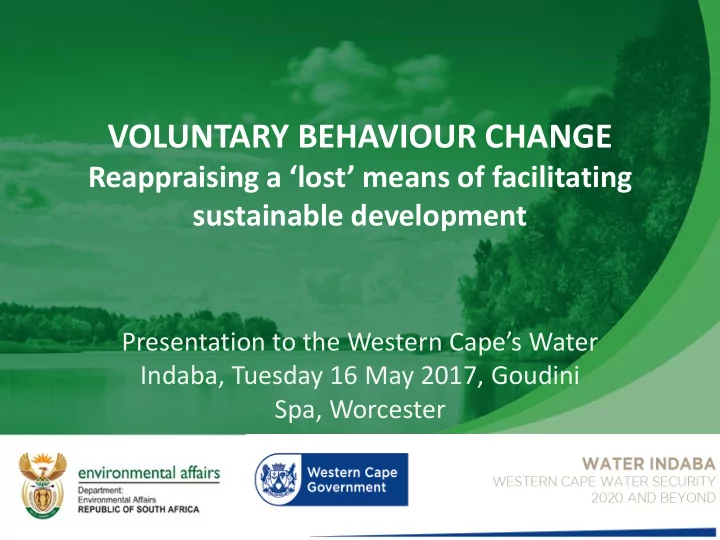

VOLUNTARY BEHAVIOUR CHANGE Reappraising a ‘lost’ means of facilitating sustainable development Presentation to the Western Cape’s Water Indaba, Tuesday 16 May 2017, Goudini Spa, Worcester
The global risks landscape 2017
The comparative South African risks landscape 2016 – IRMSA 2016 Report
Why is ‘water crises’ the only perceived South African environmental risk? • Is the fact that the identified South African risks, unlike the international risks, make little mention of climate or environment- related risks due to – All related to public – A perception that we are doing such a good job of environmental awareness management and climate change response that we are efficiently and effectively managing any associated risk; or – The majority of South Africans do not believe that environmental degradation or climate change are risks; or – The majority of South Africans do not know that environmental degradation or climate change presents a significant risk; or – The identified risks are really more significant than environmental degradation or climate change. Is “reputational damage or adverse media or social media attention” really a greater risk to South African industry than a water crisis?
Voluntary changes in behaviour that contribute to the common good are more sustainable, efficient and effective than attempts to change behaviour through rules, laws and regulation
The power of public awareness • In the late 1980s early 1990s South Africa wanted to phase out CFCs in compliance with its international ozone-layer protection commitments. • To this end government considered a number of strategies including legislated phase out targets, compulsory product labelling, import controls, product bans, replacement incentives, etc. • As it turned out, the strategy that actually prevailed was not one the government was considering – NGOs raised public awareness around ozone-depletion which led to consumer pressure for CFC alternatives which led to voluntary product labelling which led to CFC- containing products becoming unsaleable.
We must respond to increasingly rapid change • Global economic change - The financial crisis of 2007 – 2008 is considered by many economists to have been the worst financial crisis since the Great Depression of the 1930s. • Global political change – Trump and Brexit. • Global Climate Change . • Global Tipping Points – the point at which a series of small changes or incidents becomes significant enough to cause a larger, more important, and even irreversible, change. • If people do not have easy access to relevant, current, complete, accurate, credible and meaningful information, they are getting their information from far more dubious sources via the internet and social networks
Doing more better with less • The compliance and enforcement rule of thumb – For a just law… – 10% of the regulated community will always comply; – 10% of the regulated community will never comply; – The remaining 80% will only comply if they believe that the 10% of baddies will be brought to book • What this means is that – – 90% of the regulated community will comply if visible enforcement actions build a general perception that baddies will be brought to book – 90% of the regulated community will not comply if there is no visible enforcement
Points to ponder • Focus our resources and efforts – e.g. a high profile, long-lived, outreach campaign focussing on water and water security that is informed by accurate, complete, current and relevant information • Outreach as standard practise – Outreach activities associated with all significant interventions – planned by outreach experts, but fully informed by the technical experts • Information, not propaganda – the information we share must always be regarded as credible – not false news or alternative facts
Recommend
More recommend